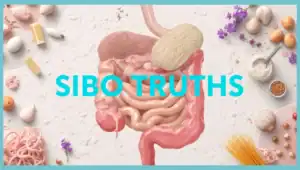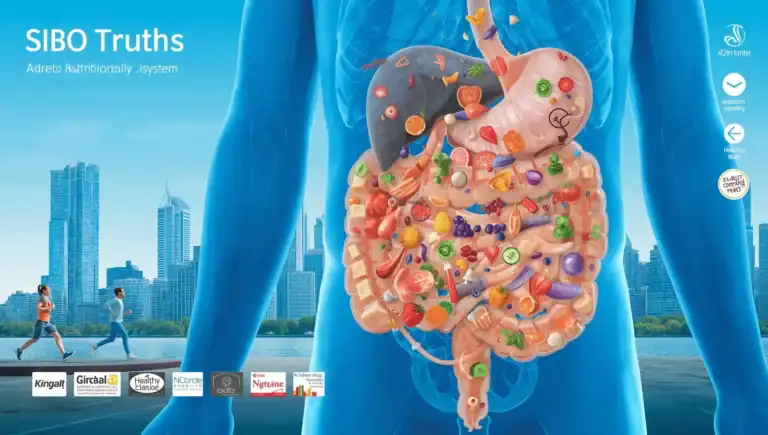SIBO truths about nutritional deficiencies: . Learn how to identify gaps, restore balance, and nourish your body for optimal gut health and vitality.For millions, the daily struggle with bloating, abdominal pain, and erratic bowels is a frustrating reality. Often, these symptoms are attributed to Irritable Bowel Syndrome (IBS), but a frequently overlooked culprit is Small Intestinal Bacterial Overgrowth (SIBO).
While the digestive discomfort is debilitating enough, one of the most insidious and dangerous aspects of SIBO is its silent role in creating widespread nutritional deficiencies. This article uncovers the critical connection between SIBO and malnutrition, explaining why even those eating a perfect diet can find themselves starved for essential nutrients.

What is SIBO and SIBO Truths? A Brief Overview
SIBO occurs when there is an abnormal, excessive amount of bacteria colonizing the small intestine. Unlike the large intestine, which is designed to host a vast ecosystem of bacteria, the small intestine should have relatively low bacterial counts. When this bacterial balance is disrupted, it doesn’t just cause physical symptoms—it directly interferes with your body’s primary engine for nutrient absorption.
The Hidden Link: How SIBO Directly Causes Nutritional Deficiencies
The connection between SIBO and nutritional deficiencies isn’t coincidental; it’s a direct cause-and-effect relationship. The overgrown bacteria in your small intestine effectively “steal” and interfere with the nutrients you consume before your body has a chance to absorb them. This process happens through several key mechanisms:
1. Bacterial Consumption of Nutrients
The excessive bacteria in the small intestine need to eat to survive. They consume the very nutrients you’ve ingested for your own health, particularly:
-
Vitamin B12: This is the most commonly deficient vitamin in SIBO patients. The bacteria have a particular affinity for B12, binding to it and rendering it unusable by your body.
-
Iron: Certain bacteria can also utilize iron, contributing to deficiencies that lead to anemia.
2. Damage to the Intestinal Lining
The metabolic byproducts of these bacteria, especially gases like hydrogen and methane, can be irritating and inflammatory to the delicate lining of the small intestine (the mucosal barrier). This lining is covered in microscopic, finger-like projections called villi. Chronic inflammation can damage and flatten these villi, which are responsible for absorbing nutrients. This damage mimics that seen in celiac disease and leads to global malabsorption.
3. Impaired Fat Absorption and Fat-Soluble Vitamin Deficiency
This is one of the most significant shocking truths about SIBO and nutritional deficiencies. The bacteria deconjugate bile acids. Bile acids are essential for emulsifying and absorbing dietary fats. When they are broken down prematurely by bacteria, fat absorption plummets. This leads to:
-
Steatorrhea (pale, foul-smelling, floating stools)
-
Deficiencies in fat-soluble vitamins: A, D, E, and K.
-
Vitamin D deficiency is extremely common, impacting bone health and immune function.
-
Vitamin A deficiency can affect vision and skin health.
-
Vitamin K deficiency can impair blood clotting.
-
4. Enzyme Inactivation
The bacterial overgrowth can interfere with the activity of crucial digestive enzymes produced by the pancreas and the small intestine itself. For example, it can inactivate lactase, the enzyme needed to break down lactose, leading to new-onset lactose intolerance and further reducing the variety of foods one can comfortably eat to obtain nutrition.
Key Nutrient Deficiencies to Watch For
If you have or suspect SIBO, being aware of these common deficiencies is crucial. Symptoms often extend far beyond the gut.
-
Iron Deficiency Anemia: Fatigue, weakness, pale skin, shortness of breath.
-
Vitamin B12 Deficiency: Profound fatigue, brain fog, tingling in hands and feet (neuropathy), mood changes.
-
Fat-Soluble Vitamin Deficiencies:
-
Vitamin D: Bone pain, low mood, weakened immunity.
-
Vitamin A: Night blindness, dry skin.
-
Vitamin E: Nerve damage, muscle weakness.
-
Vitamin K: Easy bruising, excessive bleeding.
-
-
Other B-Vitamins & Minerals: Deficiencies in thiamine (B1), niacin (B3), and magnesium are also common, contributing to fatigue and muscle cramps.
Addressing the Deficiencies: A Two-Pronged Approach
Treating the nutritional deficiencies caused by SIBO requires a dual strategy: correcting the nutrient levels and treating the root cause—the bacterial overgrowth itself.
1. Treating the Root Cause (SIBO)
This typically involves a combination of dietary changes (like a low-fermentation diet) and antimicrobial therapy, which may include antibiotics like rifaximin or herbal antimicrobials. This step is essential to stop the ongoing nutrient theft and gut lining damage.
2. Replenishing Nutrient Stores
While treating SIBO, targeted nutritional support is vital:
-
Work with a Professional: A doctor or dietitian can test for specific deficiencies and recommend appropriate types and dosages of supplements.
-
Choose the Right Form: For those with severe malabsorption, sublingual B12, liquid vitamin D, and micellized forms of fat-soluble vitamins may be better absorbed than standard pills.
-
Support Gut Healing: Incorporating gut-healing nutrients like zinc, L-glutamine, and omega-3 fatty acids can help repair the damaged intestinal lining.
Frequently Asked Questions (FAQ)
Q1: Can you have SIBO and not be nutrient deficient?
A: It’s possible, especially in early or milder cases, but it is exceedingly rare for long-standing SIBO to not cause at least subclinical deficiencies. The very nature of the condition predisposes individuals to malabsorption.
Q2: What is the most common vitamin deficiency in SIBO?
A: Vitamin B12 deficiency is arguably the most common and classic deficiency associated with SIBO, due to direct bacterial consumption.
Q3: Will taking supplements fix the deficiencies if I still have SIBO?
A: While supplements can help raise nutrient levels, it is an uphill battle. If the underlying SIBO is not treated, the bacteria will continue to consume nutrients and damage the absorption pathways, making full correction very difficult.
Q4: How long does it take to correct nutrient deficiencies after treating SIBO?
A: This varies greatly depending on the severity of the deficiency and the individual. Some people feel improvement in energy (from B12 or iron) within weeks. Restoring fat-soluble vitamin levels and fully healing the gut lining can take several months of consistent supplementation and a healthy diet.
Q5: Should I get my vitamin levels checked if I have SIBO?
A: Absolutely. A comprehensive nutritional panel—including Iron/Ferritin, Vitamin B12, Methylmalonic Acid (a more sensitive test for B12 deficiency), and Vitamin D—is highly recommended for anyone diagnosed with or suspected of having SIBO. This provides a crucial baseline for targeted treatment.
If you’re interested in exploring more about healthy eating and lifestyle tips, feel free to check out our latest blog on Papaya Seeds Benefit
Stay tuned for more informative content and don’t forget to subscribe to our newsletter for updates on future articles.
